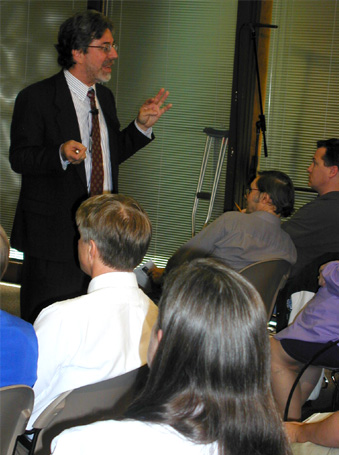|
|
Campus Learns Portal Lessons
Princeton Expert Shares Web Portal Visions  Question: How is UC Davis tackling portal technology? Question: How is UC Davis tackling portal technology?A. It builds its very own Web portal called MyUCDavis to serve faculty, students, staff, and guests as they enter the online world of UC Davis. B. It commits to continue researching and implementing the most appropriate application of portal technology for the campus. C. It invites a national portal expert from Princeton University to campus to discuss the future of Web portals. D. All of the above. Correct Answer: D. All of the Above
Explanation of correct answer: (A&B) You probably already know about the campus' Web portal, MyUCDavis, located at http://my.ucdavis.edu/. You may even know about the New Business Architecture and the Advanced Technology Project underway to explore the viability of maintaining a robust Web portal into the campus' future. (C) However, did you know that the campus went one step further in its plan to fully immerse itself in portal proficiency when, on March 15, Information and Educational Technology (IET) hosted a special symposium with national portal expert, Howard Strauss? If You Didn't Answer the Question Correctly, Read On For Extra Credit
On March 15, Howard Strauss delivered a presentation and instigated a lively brainstorming session with a campus community that is rapidly becoming conversant with portal technology. Strauss, a contributor to the recent book, Web Portals in Higher Education (reviewed in this issue), spoke to a unique combination of individuals, from technologists to campus administrators and users. Some participants traveled from Berkeley, Merced, and Santa Cruz to participate in Strauss' discussion. The Manager of Academic Applications at Princeton University, Strauss is widely known as an expert on the Web, presenting workshops and sessions at conferences and virtual seminars nationwide.
Vice Provost Bruno co-sponsored the event in which Strauss explained the multiple ways by which "A Home Page Doth Not a Portal Make." With this intriguing title, he led the audience through a series of questions: What's a portal? Why have one? What are the components that make a portal vital? What technical and administrative issues come along with portal development and implementation? In other words, he reminded us that not only is a portal a Web hub from which users can locate all the Web content they commonly use, but it is also a tool dedicated to revolutionizing the computer desktop with the following principles:
Strauss provided an altogether exciting vision of how technology providers can make technology users happier. At a time when there are more than 3 billion institution-centric Web pages on the Internet offering millions of different services, it's about time we see individually-tailored Web hubs for each and every one of us. After all, as Strauss says, "cutting-edge service is much more important than cutting-edge technology." Another Statute of Portal Common Sense
In the ideal portal, users shouldn't have to enter a password more than once for all the various applications they access. Strauss could easily make our campus feel a little proud about the progress of our own portal, MyUCDavis. True to Strauss' portal forecast, MyUCDavis is beginning to develop a single sign-on authentication process for the various portal functions that require passwords. MyUCDavis is Teacher's Pet
In fact, Strauss was interested enough in MyUCDavis to invite some of its developers to join him at the major higher education conference, EDUCAUSE, where he'll present a seminar on portals. Of particular interest to Strauss were the help icons for each of the channels, the Channel Builder feature, and the fact that our portal is "homegrown." Challenges for the Future
After a lunch break, Strauss greeted symposium participants with a colorful vision of future portals. Who needs a wallet when you've got what he calls a Personal Ubiquitous Portal (PUP)? Not only does Strauss believe that PUPs, or telematons ("personal, special purpose, wireless, networked, intelligent devices with local memory"), will replace general purpose computers, he also argues that these telematons will come in different functional shapes and sizes, meeting different purposes, from togamatons (wearable computers built into your watch, glasses or clothes) to automatons (built into your car) to refrigermatons (built into your refrigerator door) and cartmatons (built into your shopping cart). To top it all off, Strauss described the kinds of advanced authentification methods telematons will use, ensuing a fascinating discussion about emerging technologies such as biometrics (digital scannings of fingerprints, for instance) that he feels will efficiently replace the use of passwords.If you'd like to find out about the host of topics Strauss discussed, visit his dynamic and easy-to-understand PowerPoint presentations at the Portal Symposium Web page. |